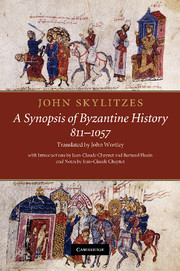Book contents
- Frontmatter
- Contents
- The English translator’s Preface
- Introduction
- Re-writing history: John Skylitzes’ Synopsis historion
- Foreword
- Chapter 1 Michael I Rangabe, the Kouropalates [811–813]
- Chapter 2 Leo V the Armenian [813–820]
- Chapter 3 Michael II the Stammerer [820–829]
- Chapter 4 Theophilos [829–842]
- Chapter 5 Michael III, the son of Theophilos [842–867], and his mother Theodora [842–862]
- Chapter 6 Basil I Kephalas, the Macedonian [867–886]
- Chapter 7 Leo VI the Philosopher (the Wise) [886–912]
- Chapter 8 Alexander [912–913]
- Chapter 9 Constantine VII, Porphyrogennetos [913–959]
- Chapter 10 Romanos I Lekapenos [919–944]
- Chapter 11 Constantine VII [944–959]
- Chapter 12 Romanos II the Younger [959–963]
- Chapter 13 Basil II Bulgaroktonos and Constantine VIII [976–1025]
- Chapter 14 Nikephoros II Phokas [963–969]
- Chapter 15 John I Tzimiskes [969–976]
- Chapter 16 Basil II and Constantine VIII bis [976–1025]
- Chapter 17 Constantine VIII [1025–1028]
- Chapter 18 Romanos III Argyros [1028–1034]
- Chapter 19 Michael IV the Paphlagonian [1034–1041]
- Chapter 20 Michael V Kalaphates [1041–1042]
- Chapter 21 Constantine IX Monomachos [1042–1055]
- Chapter 22 Theodora [1055–1056]
- Chapter 23 Michael VI the Elder/Stratiotikos [1056–1057]
- Glossary
- Bibliography
- Index
- References
Chapter 4 - Theophilos [829–842]
Published online by Cambridge University Press: 05 July 2014
- Frontmatter
- Contents
- The English translator’s Preface
- Introduction
- Re-writing history: John Skylitzes’ Synopsis historion
- Foreword
- Chapter 1 Michael I Rangabe, the Kouropalates [811–813]
- Chapter 2 Leo V the Armenian [813–820]
- Chapter 3 Michael II the Stammerer [820–829]
- Chapter 4 Theophilos [829–842]
- Chapter 5 Michael III, the son of Theophilos [842–867], and his mother Theodora [842–862]
- Chapter 6 Basil I Kephalas, the Macedonian [867–886]
- Chapter 7 Leo VI the Philosopher (the Wise) [886–912]
- Chapter 8 Alexander [912–913]
- Chapter 9 Constantine VII, Porphyrogennetos [913–959]
- Chapter 10 Romanos I Lekapenos [919–944]
- Chapter 11 Constantine VII [944–959]
- Chapter 12 Romanos II the Younger [959–963]
- Chapter 13 Basil II Bulgaroktonos and Constantine VIII [976–1025]
- Chapter 14 Nikephoros II Phokas [963–969]
- Chapter 15 John I Tzimiskes [969–976]
- Chapter 16 Basil II and Constantine VIII bis [976–1025]
- Chapter 17 Constantine VIII [1025–1028]
- Chapter 18 Romanos III Argyros [1028–1034]
- Chapter 19 Michael IV the Paphlagonian [1034–1041]
- Chapter 20 Michael V Kalaphates [1041–1042]
- Chapter 21 Constantine IX Monomachos [1042–1055]
- Chapter 22 Theodora [1055–1056]
- Chapter 23 Michael VI the Elder/Stratiotikos [1056–1057]
- Glossary
- Bibliography
- Index
- References
Summary
After the death of Michael [II], his son, Theophilos (who was already of age), succeeded to his father’s throne in the month of October, in the eighth year of the indiction. According to what he said, he wanted to acquire a reputation for being a zealous devotee of justice and a diligent observer of the laws of the state, but the truth of the matter is that he made this pretence in order to distance himself from the conspirators, thus ensuring that nobody make a desperate move against him.
So, from the outset, he resolved to bring ruin and destruction on all those who had taken part with his father in the death of Leo [V]. To this end, he issued a command that everybody who enjoyed imperial titles and all who had benefited from imperial munificence in any way whatsoever were to assemble in the Magnaura; that is, at the Pentapyrgion. When that was accomplished and everybody was gathered together as he had commanded, keeping the ferocity of his soul concealed, he spoke to the assembled company in a modest and gentle voice: ‘O my people and my inheritance; it was the will and desire of my late father to bestow many titles, benefits and other honours upon those who supported and defended his rule. Events overtook him and it is to me, the successor to his throne, that he has left this undischarged debt, in order that he not appear ungrateful to his supporters. So, let each one of those men step forward from the crowd and show himself to us plainly; so that, knowing which of you are friends, we may reward you as you deserve.’ All those wretches who had participated in the slaying of Leo [V] were deceived and had their heads turned by these words, with the result that each one showed himself. Having thus netted his prey, Theophilos immediately ordered the eparch to apply [50] the laws of the state to them, saying: ‘Go to it, eparch; you have authority from God and from our own Serenity to pass judgement on these persons and to reward them according to their deeds: not only for having stained their hands with human blood, but also because they slew the Lord’s anointed within the sanctuary.’
- Type
- Chapter
- Information
- John Skylitzes: A Synopsis of Byzantine History, 811–1057Translation and Notes, pp. 51 - 81Publisher: Cambridge University PressPrint publication year: 2010

